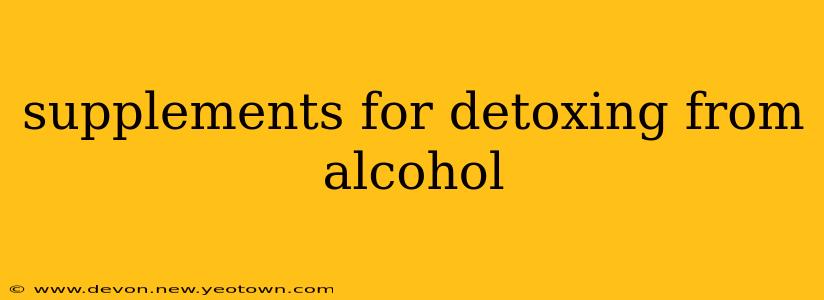Alcohol withdrawal can be incredibly challenging, both physically and mentally. While professional medical supervision is crucial for safe and effective detoxification, certain supplements can play a supportive role under the guidance of a doctor or healthcare professional. This isn't about a quick fix; it's about supporting your body's natural healing processes during a difficult transition. Let's explore the potential benefits and important considerations.
This isn't medical advice. Always consult your doctor or a qualified healthcare professional before starting any new supplement regimen, especially during alcohol withdrawal. They can assess your specific needs and recommend the most appropriate course of action.
What Supplements Might Help During Alcohol Detox?
The journey to sobriety is deeply personal, and there's no one-size-fits-all approach. However, several supplements have shown promise in supporting various aspects of alcohol withdrawal. Remember, these are only supportive measures; they cannot replace professional medical care.
1. B Vitamins: Are B vitamins important for alcohol detox?
Alcohol depletes essential B vitamins, which play a vital role in nerve function, energy production, and overall health. Deficiencies can exacerbate withdrawal symptoms. Supplements containing thiamine (B1), riboflavin (B2), niacin (B3), and other B vitamins may help mitigate these deficiencies. However, it's crucial to get individual B vitamin levels checked by a medical professional, as taking too much of certain B vitamins can be harmful.
2. Magnesium: How does magnesium help with alcohol withdrawal?
Magnesium is another essential mineral often depleted by excessive alcohol consumption. It plays a crucial role in nerve function and muscle relaxation, making it particularly relevant during alcohol withdrawal, which can cause tremors, seizures, and anxiety. Magnesium supplementation, under medical supervision, may help alleviate some of these symptoms.
3. NAC (N-Acetylcysteine): What is NAC and its role in alcohol detox?
NAC is an antioxidant that supports liver health and detoxification. Alcohol places a significant strain on the liver, and NAC may help protect it from further damage. However, it's crucial to understand that NAC is not a cure for liver damage caused by alcohol; it is a supportive measure. Furthermore, dosage and timing should be discussed with a healthcare professional.
4. Milk Thistle: Does milk thistle support liver health during alcohol detox?
Milk thistle is another herb traditionally used to support liver health. It contains silymarin, an antioxidant believed to protect liver cells from damage. Again, this is supportive care only and shouldn't replace medical treatment for liver conditions. Always consult your doctor before using milk thistle, particularly if you're taking other medications.
5. Adaptogens (e.g., Ashwagandha, Rhodiola): Can adaptogens aid in alcohol withdrawal?
Adaptogens are herbs believed to help the body adapt to stress. Alcohol withdrawal is undeniably stressful, both physically and mentally. Ashwagandha and Rhodiola are two commonly used adaptogens, and some individuals find them helpful for managing anxiety, stress, and fatigue associated with withdrawal. However, more research is needed in this area, particularly regarding alcohol withdrawal. Use with caution, and under medical guidance.
Important Considerations:
-
Professional Medical Supervision: Alcohol withdrawal can be life-threatening. Never attempt to detox from alcohol without the guidance of a doctor or healthcare professional. They can monitor your vital signs, adjust medication as needed, and provide safe and effective support.
-
Individualized Approach: The best supplements and dosages will vary depending on individual circumstances, including the severity of alcohol dependence, overall health, and other medical conditions. A healthcare professional can personalize recommendations based on your specific needs.
-
Potential Drug Interactions: Supplements can interact with medications, including those used to manage alcohol withdrawal. It's vital to disclose all supplements to your healthcare provider to avoid harmful interactions.
-
No Quick Fix: Supplements are not a magic bullet for alcohol withdrawal. They are supportive tools used in conjunction with professional medical care, therapy, and lifestyle changes. Recovery is a journey, not a race.
This information is intended for educational purposes only and does not constitute medical advice. Always consult with a qualified healthcare professional before starting any new supplement regimen, especially during alcohol withdrawal. They can help you develop a comprehensive plan to support your recovery journey safely and effectively.

